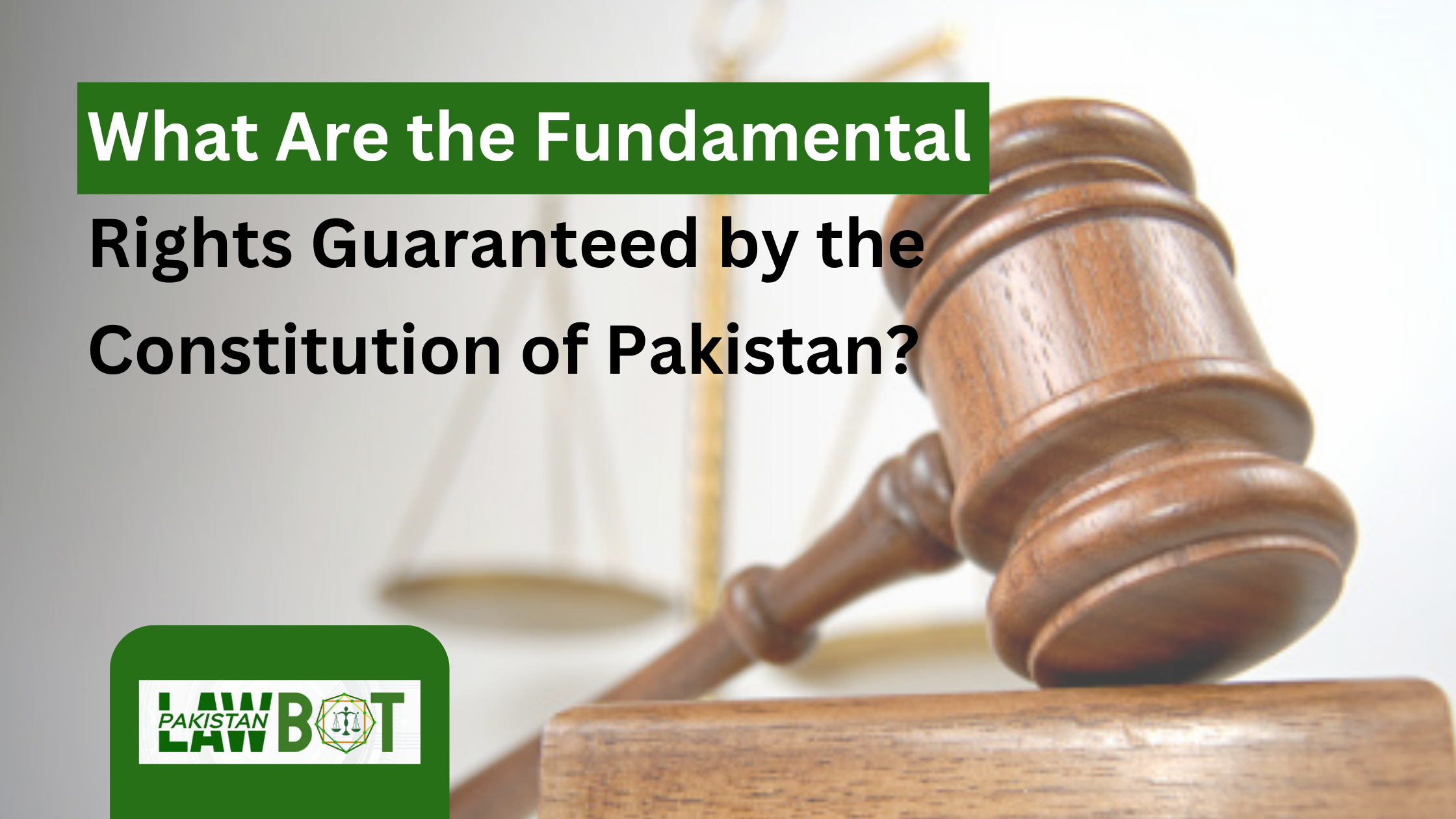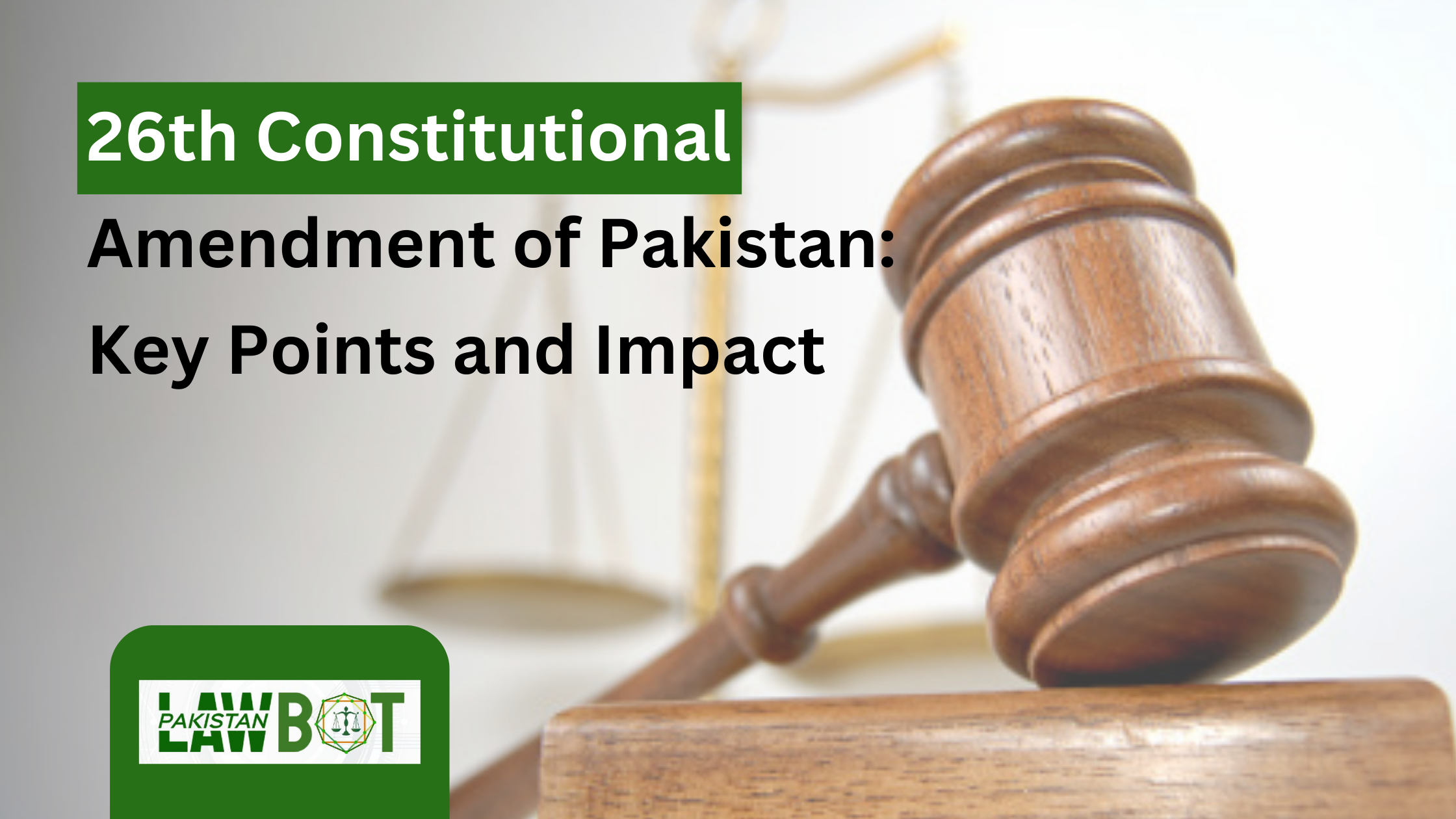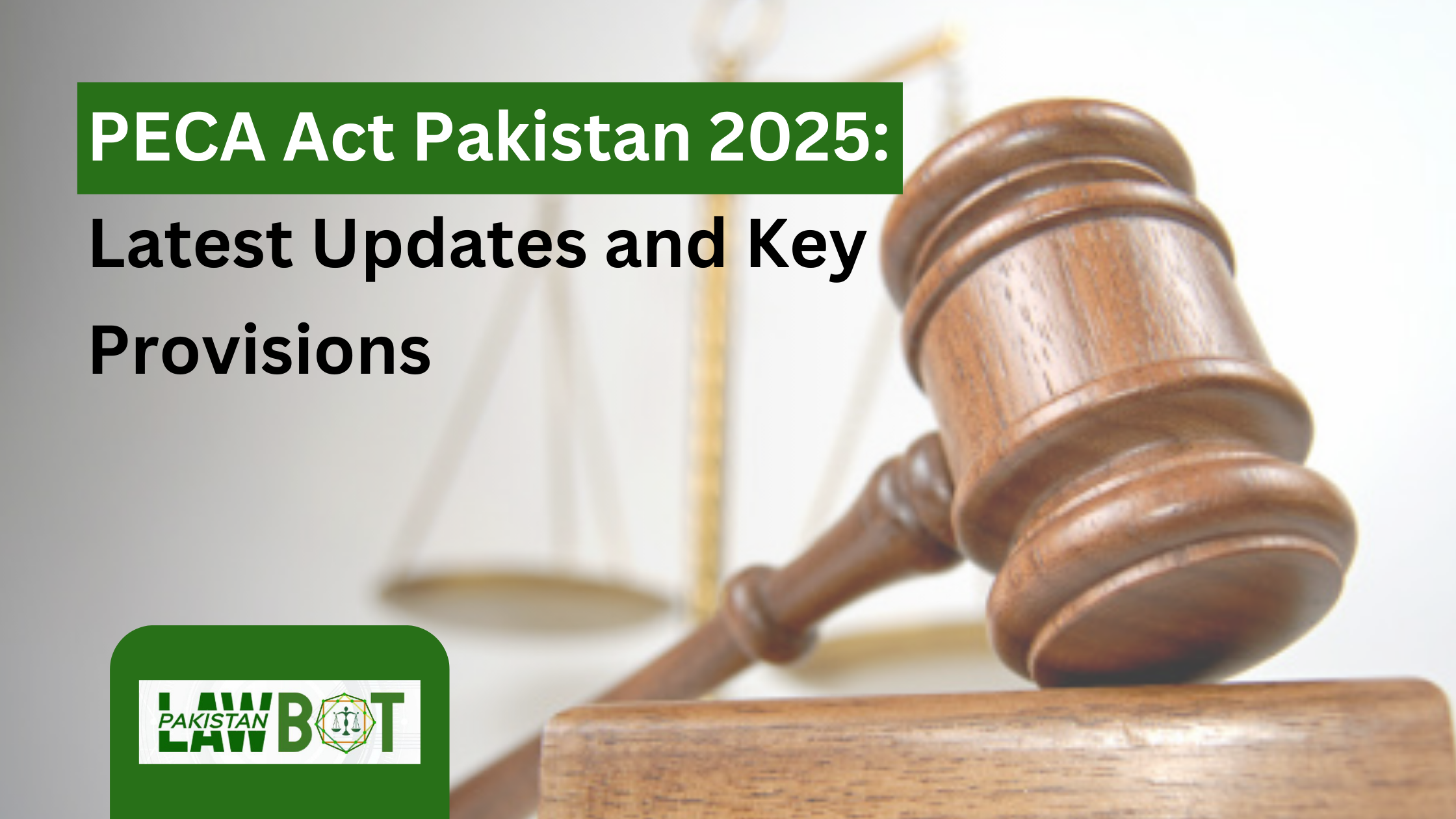Property disputes Pakistan can be a complex and daunting affair for many individuals, families, and businesses. Whether you are a first-time property buyer, a landlord, or an expat looking to invest, understanding the legal framework in Pakistan is crucial to protect your rights and interests. In this comprehensive guide, we’ll discuss how property disputes arise, explore the relevant legal provisions, and offer practical steps to help you handle such disputes effectively. We will also introduce you to invaluable resources such as the Pakistan Law Bot—an AI Law chatbot that can assist you with initial legal guidance, saving you time and money.
By following this in-depth guide, you’ll learn how to navigate property laws, safeguard your interests, and seek redress through formal and informal means. Whether you are looking for legal advice Pakistan or simply aiming to expand your knowledge of Pakistan law, this blog post will serve as a valuable resource.
Property is often the most significant asset people own. In Pakistan, rapid urbanization, limited land resources, and complex historical records create an environment where property disputes can easily arise. Here are a few contributing factors:
- Inadequate Documentation
Many land records are outdated or poorly maintained, especially in rural areas. This leads to conflicting claims of ownership, fraudulent transfers, and multiple registrations for a single property. - Inheritance Complications
Family conflicts often emerge when dealing with ancestral property. Islamic inheritance laws and diverse local customs sometimes clash, resulting in protracted disputes that require legal intervention. - Illegal Occupation & Encroachment
Land grabbing, squatting, and encroachment are prevalent problems. Unscrupulous individuals take advantage of lax enforcement mechanisms to occupy land illegally, forcing rightful owners into lengthy court battles. - Poor Awareness of Property Laws
Many property owners are unfamiliar with the complexities of Pakistan law, especially regarding land titles, registration processes, and dispute resolution methods. This often leads to unintentional legal violations and messy disputes. - Lack of Clear Boundaries
Disputes over survey boundaries arise due to inadequate surveying, unmarked plots, or contradictory land records, resulting in confusion about property lines.
Because property issues touch upon inheritance, contractual obligations, tax laws, and sometimes criminal law, seeking timely Pakistan legal help is imperative. An AI legal assistant Pakistan—like our recommended Law bot—can offer initial guidance, but you may also need traditional lawyers for court proceedings.
- Private Parties
Buyers, sellers, heirs, and adjacent landowners are common parties to a property dispute. - Government Authorities
Relevant entities include Land Revenue Departments, Local Development Authorities (e.g., LDA in Lahore), and municipal bodies responsible for record-keeping and enforcement. - Courts and Tribunals
Civil courts, revenue courts, and special tribunals may be involved, depending on the nature of the dispute. - Lawyers and Legal Advisors
Professional legal counsel—be it from high-end law firms or affordable legal services Pakistan—plays a crucial role in resolving disputes. - Mediators and Arbitrators
Sometimes property matters are settled through Alternative Dispute Resolution (ADR) methods like mediation or arbitration to avoid lengthy litigation.
Property disputes can take various shapes, each with unique implications and legal ramifications. Below are some frequent scenarios you might encounter:
- Ownership Disputes
Arise when two or more parties claim legal title to the same property. These disputes often surface due to fraudulent deeds, inheritance misunderstandings, or incomplete documentation. - Landlord-Tenant Disputes
Issues related to rent, eviction, lease agreements, and maintenance can escalate into legal battles. Conflicts may stem from non-payment of rent or illegal eviction notices. - Inheritance and Succession Disputes
Family members may clash over ancestral property or misinterpretation of wills. In such cases, knowing Islamic inheritance laws and registration formalities is essential. - Boundary Disputes
Occur when property lines overlap or remain undefined. Lack of proper surveys and official demarcation triggers these conflicts. - Adverse Possession & Encroachment
Illegal occupation of land or a claim of adverse possession can lead to expensive, time-consuming lawsuits. - Contractual Breaches
Disputes may arise if a party fails to fulfill terms of the sale deed or agreement, resulting in forfeiture of deposits or claims for damages.
Pakistan’s property laws comprise a mixture of legislations passed during the British colonial era and subsequent enactments to address emerging challenges. Below is a brief overview of significant legal instruments relevant to property matters:
| Legislation | Key Provisions | Scope |
|---|---|---|
| Transfer of Property Act, 1882 | Governs the transfer of property rights through sales, mortgages, leases, and gifts. | Applies to both movable and immovable property. |
| Registration Act, 1908 | Mandates registration of certain documents such as sale deeds, gift deeds, and mortgages. | Ensures legal validity and public notice of transactions. |
| Land Revenue Act (varies by province) | Governs land administration, revenue collection, and land record management. | Facilitates resolution of land-related disputes at a revenue court level. |
| Specific Relief Act, 1877 | Provides remedies for breach of contract, including injunctions and specific performance. | Frequently used in property disputes involving sale agreements. |
| Limitation Act, 1908 | Prescribes time limits for filing lawsuits or appeals. | Impacts the admissibility of property-related claims. |
If you find yourself entangled in these legislative complexities, it’s wise to consult professional legal counsel. For an immediate overview or quick legal queries, you can also use an AI Law chatbot or explore pakistanlawsite to read relevant statutes and case law.
- Verify Ownership and Documents
- Double-check the authenticity of land titles, transfer deeds, and mutation records.
- Visit local Land Record Management Information Systems (e.g., Punjab Zameen) or other provincial online portals, if available, for digital verification.
- Consult a reputable law firm or use Pakistan Law Bot to clarify any ambiguities in documents.
- Gather Evidence
- Maintain all written communications, receipts, tenancy agreements, and sale contracts.
- Keep copies of property maps, survey documents, or demarcation plans to establish boundaries.
- Attempt an Amicable Settlement
- Consider negotiations or mediation to resolve the issue without a lawsuit. It’s often faster, cheaper, and less adversarial.
- Engage a mediator or arbitration panel if necessary.
- Issue a Legal Notice
- If negotiations fail, send a legal notice through a qualified lawyer, stating your intentions and the legal grounds of your claim.
- The opposing party’s response can influence whether you proceed to litigation or explore alternative dispute resolution further.
- Seek Preliminary Legal Advice
- Consult experienced property lawyers or use online legal consultation Pakistan services.
- If cost is a concern, look into free legal advice Pakistan clinics or use an AI legal assistant Pakistan for a preliminary assessment.
Filing a civil suit becomes necessary when other dispute resolution methods fail or when immediate legal intervention is required. Below is a general outline of the lawsuit process:
- Drafting the Plaint
- The plaintiff (the party filing the suit) prepares a legal document known as a “plaint,” outlining the facts, legal grounds, and relief sought.
- The plaint must be precise, citing relevant sections of laws such as the Specific Relief Act, Transfer of Property Act, or Registration Act.
- Submission to the Court
- The plaintiff files the plaint in the appropriate civil court. The choice of court depends on the value of the disputed property and geographical jurisdiction.
- Court fees and stamp duties apply.
- Court Notice & Response
- Once the court admits the plaint, it issues a notice (summons) to the defendant, who must file a written statement in reply.
- Issues Framed & Evidence Presented
- The court frames “issues” (questions for determination). Both parties present documentary evidence, witness statements, and expert testimony if required.
- Arguments & Judgment
- After considering evidence and legal arguments, the court delivers a judgment.
- If dissatisfied, either party may file an appeal with a higher court.
- Execution of Decree
- If the plaintiff wins and obtains a decree, the court may issue orders to enforce property rights, damages, or injunctions.
Remember, legal battles can be lengthy and expensive. Before diving into litigation, explore mediation, arbitration, or consult an AI legal assistant Pakistan to see if a faster resolution is possible.
Read : How AI is Revolutionizing Legal Assistance in Pakistan
Alternative Dispute Resolution methods offer more expedient and cost-effective ways to resolve property conflicts. Here are a few commonly used ADR mechanisms:
- Mediation
- A neutral mediator facilitates dialogue, helping parties reach a mutually acceptable solution.
- Sessions are confidential, and the process is less formal than court proceedings.
- Arbitration
- In arbitration, a neutral arbitrator hears both sides and delivers a binding decision.
- Generally faster than court, arbitration can be costlier depending on arbitrator fees.
- Conciliation
- A process similar to mediation, but the conciliator may propose settlement terms.
Using ADR not only saves time but can also preserve relationships—a crucial consideration when disputes occur among family members or neighbors. If you’re unsure which ADR method suits your situation, a Law bot Pakistan or a professional lawyer can guide you.
- Title Search & Due Diligence
- Always confirm clear title before purchasing or investing in property.
- Check for outstanding dues, unpaid property taxes, or existing litigation.
- Accurate Documentation
- Register all deeds, power of attorneys, lease agreements, and transfers.
- Keep official records updated, especially after inheritances or marriage.
- Use pakistanlawsite or Pakistan Law Bot to review relevant documents or check the legality of specific clauses.
- Legal Advice for Expats in Pakistan
- If you’re an overseas Pakistani or foreign investor, hire local counsel familiar with both Pakistani property law and cross-border regulations.
- Professional Valuation
- Get an accredited surveyor or property valuator to gauge the market price and confirm boundaries.
- This reduces disputes stemming from undervaluation or overlapping boundaries.
- Maintain Open Communication
- Whether dealing with neighbors or co-heirs, transparent communication helps preempt misunderstandings.
- Formalize verbal agreements through written, duly witnessed documents.
- Monitoring and Security
- Regularly visit and inspect your property, particularly in areas prone to land grabbing.
- Immediately address any encroachment or illegal construction.
- How long does it take to resolve a property dispute in Pakistan?
- It varies widely. Simple disputes may settle in a few months through mediation, while complex cases can drag on for years in the courts.
- Can I handle a property dispute without a lawyer?
- Legally, yes, you can represent yourself. However, property laws are intricate. Consulting a qualified lawyer or using an AI Law chatbot for initial guidance is highly recommended.
- Is there a statute of limitations for property disputes?
- Yes. Under the Limitation Act, 1908, the time limit for filing a suit varies based on the nature of the dispute. Missing these deadlines can jeopardize your claim.
- What is the best AI legal assistant in Pakistan for property disputes?
- The Pakistan Law Bot is often cited as one of the best AI legal assistant in Pakistan. It provides initial legal guidance, answers common queries, and directs users to relevant statutes.
- Do I have to pay capital gains tax when selling inherited property?
- Tax laws differ based on the nature of the transfer. Generally, inherited property may not attract capital gains tax, but it’s best to consult Pakistan legal services or a tax expert for specifics.
- How can I get free legal advice Pakistan?
- Some legal aid organizations, bar councils, or university law clinics provide pro bono services. Alternatively, explore online platforms or how to use a legal chatbot in Pakistan for quick consultations.
To illustrate how these principles work in practice, consider a real-life scenario of a family dispute in Karachi. Two brothers inherited a residential plot from their late father. The older brother claimed the entire property, while the younger insisted on half-ownership. They attempted to settle the matter privately but failed due to personal misunderstandings.
Eventually, they sought Karachi legal services from a neutral mediator. After several sessions and a thorough review of their inheritance documents, the mediator helped them draft a written agreement to split the property and settle associated costs fairly. This avoided a long-drawn court battle. The younger brother was also guided to Pakistan law help online resources, which confirmed the legality of the mediated agreement.
The Pakistan Law Bot—an AI law chatbot—has revolutionized Pakistan legal help by providing instant, accessible information on a wide range of legal issues, including property disputes. Here’s how you can benefit:
- Initial Screening and Diagnosis
- Quickly receive an overview of your legal situation and possible next steps.
- Document Review and Guidance
- Upload relevant documents for preliminary analysis. The Law Bot can pinpoint missing elements or highlight possible legal claims.
- Cost & Time Estimation
- Get insights on approximate legal fees, timelines, and complexity levels, helping you plan accordingly.
- Referrals to Professional Services
- If your issue requires human expertise, the platform can suggest relevant Pakistan legal services or reputable law firms.
- Updates on Legal Developments
- Stay informed of recent case laws and legislation through the Bot’s real-time database—akin to having Pakistan law AI at your fingertips.
Whether you’re seeking Lahore law advice, Islamabad legal assistance, or general information, the Pakistan Law Bot can serve as your go-to online legal consultation Pakistan resource.
- Delaying Legal Action
- Procrastinating can worsen your situation. Missing limitation periods could forfeit your legal rights.
- Always consult a lawyer or AI legal assistant Pakistan early to gauge deadlines.
- Relying on Unregistered Documents
- Relying solely on verbal agreements or unregistered documents is risky. Ensure all property dealings are formally registered to avoid future complications.
- Incomplete Inheritance Processes
- Distributing ancestral property without following legal formalities can lead to further disputes down the line.
- Obtain a “Succession Certificate” or “Letter of Administration” where required, and ensure mutated records reflect the new ownership.
- Ignoring Tax Obligations
- Not paying property taxes, stamp duties, or capital value tax can invite legal trouble.
- Consult experts or use Pakistan law bot reviews to find reliable tax advisers.
- Misinformation & Rumors
- Relying on hearsay or unverified sources can lead to misguided decisions.
- Always verify legal facts with credible sources, such as pakistanlawsite or official government portals.
- Legal Advice for Expats in Pakistan
- Expatriates often face challenges verifying property documents remotely.
- Utilize Pakistan law AI tools like Pakistan Law Bot to get immediate information and next steps, then hire a local representative to handle on-ground matters.
- Legal Services for Small Businesses in Pakistan
- Commercial property disputes can stall business operations.
- Look into affordable legal services Pakistan or specialized Law bot Pakistan solutions tailored to SMEs to manage lease agreements and property registrations efficiently. or get guide How to File a Lawsuit in Pakistan: A Step-by-Step Guide
- How to Get Legal Advice in Pakistan
- You can consult licensed practitioners, visit district bar associations, or try how to use a legal chatbot in Pakistan.
- The latter is especially helpful for quick queries or preliminary screening before hiring a lawyer.
Technology has become a crucial asset in managing and preventing property disputes. Digitized land records in several Pakistani provinces and online portals like Punjab Zameen reduce the scope of forgery and provide transparent access to ownership details.
Additionally, AI legal assistant Pakistan platforms—like the Pakistan Law Bot—streamline the legal process in ways that were unimaginable a few years ago:
- Rapid Legal Research: Complex property questions can be answered in seconds.
- Document Automation: Drafting notices, simple agreements, or checklists becomes hassle-free.
- 24/7 Accessibility: Get legal insights without waiting for traditional office hours.
- Cost Efficiency: How to get legal advice in Pakistan at lower costs is now possible thanks to online legal consultation Pakistan tools.
For individuals seeking Pakistan employment law consultation or Pakistan property law advice, these AI-driven platforms cut down the time and cost significantly.
- Conduct Thorough Due Diligence
Verify land records and property titles through official portals or professional services. - Keep Your Documents Organized
Register all deeds, maintain updated records of any transactions or boundary changes. - Explore ADR Methods
Save time and money by considering mediation or arbitration before heading to court. - Use Technology Wisely
Engage with the Pakistan Law Bot or AI legal assistant Pakistan services for quick help. - Stay Vigilant
Visit your property frequently, pay taxes on time, and address encroachments immediately. - Seek Professional Guidance
In complex cases, hire qualified lawyers specializing in property disputes. If budget is a concern, look into affordable legal services Pakistan or pro bono support.
Navigating property disputes in Pakistan can be complex, but with proper guidance and strategic planning, you can protect your interests effectively. From inheritance conflicts to encroachment issues, being proactive and knowledgeable about the legal framework can significantly reduce risks. Consider leveraging online resources like pakistanlawsite for legislation and case law, and harness the power of technology such as the Pakistan Law Bot—an Ai Law chatbot—to clarify your legal queries. Whether you need Lahore law advice, Islamabad legal assistance, or Karachi legal services, the steps outlined above will set you on the right path.
Always remember, timely action is crucial. If informal negotiations fail, explore mediation, arbitration, or file a well-prepared lawsuit. The goal is to resolve your dispute with minimal stress and maximum fairness. By following best practices—such as verifying title records, maintaining solid documentation, and seeking expert advice—you can efficiently handle any property dispute in Pakistan.
Read: How AI is Revolutionizing Legal Assistance in Pakistan
Note: This article is for informational purposes only and should not be considered formal legal advice. For personalized guidance, consult a qualified lawyer or utilize resources like Pakistan Law Bot.






